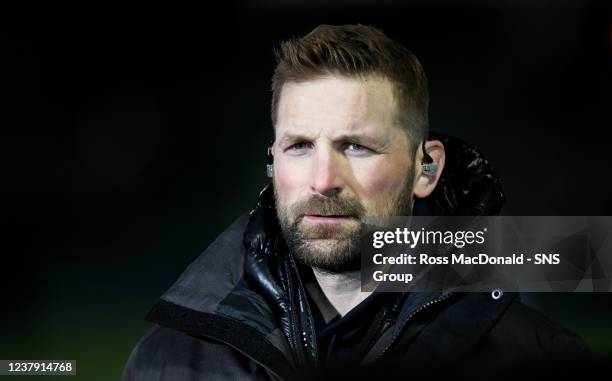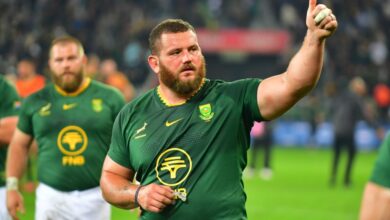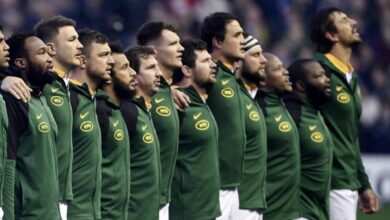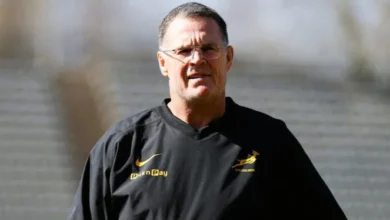I MUST BE HONEST: “South Africa are formidable, try and find a weakness in there former captain John Barclay speak out.

November will be a month of opportunities for Gregor Townsend and Scotland with the fixtures they have been dealt.
Matches against Portugal and Chile, for the ‘A’ team, provide an opportunity to try new combinations and untested players. Visits from Fiji and Australia provide an opportunity to pull away from the teams trailing them in the world rankings. And a fixture against South Africa is the ultimate opportunity for Scotland to test themself against the best.
With only one of their November opponents being ranked above Scotland, the Springboks in second place, there is also a weight of expectation this Autumn Nations Series.
For former captain John Barclay, three wins out of the four Tests is the bare minimum for his compatriots if they wish to enter December with their heads held high.
Speaking to RugbyPass recently, the 76-cap flanker dissected Scotland’s upcoming campaign, which begins with Fiji at Scottish Gas Murrayfield on Saturday.
“You would expect Scotland to beat Fiji and Portugal, and I think given where Australia are you would expect them to beat Australia,” TNT Sports pundit Barclay said.
“The rankings are there for a reason, Scotland are ranked much higher than Australia at the moment and they’re playing at home, they’ve got more consistency in selection, they know who their team is, they know how they’re trying to play, they’re just further down that evolution as a team.
“If they can beat South Africa or even come close to beating that South Africa team, I think people would potentially start to sit up. We’ve got to be someone near our best to beat them on any given day. Knock over South Africa, which is a massive if, I can’t think of a bigger win. I’m trying to think of the last win of that size for Scotland, it would be enormous.”
It was 14 years ago that Scotland – featuring Barclay in the back-row – registered their last win over the Springboks. Since then, they have lost eight on the spin, only coming within one score in one of those encounters.
Their last meeting was the opening match of the World Cup last year- an arm-wrestle of an affair which saw the eventual tournament winners pull away in the second half to win 18-3.
In what Barclay describes as a “funny game” in Marseille, the world saw that Scotland could go toe-to-toe with Rassie Erasmus’ side, but failed to do so for 80 minutes. That is not a problem reserved solely for Scotland though, rather any team facing the Springboks.
“It was a funny game against South Africa,” he said.
“I think Damian de Allende, I saw on social media, said the most physical game they play the World Cup was against Scotland. It was attritional, and it was a war, but then there was a drop-off in performance in the second half. They were in the fight but you can’t keep just absorbing and defending, you can’t then go on and actually attack.
“That was Glasgow’s point in the [United Rugby Championship] final, they just kept going after them and they tried to flip it on its head.
“South Africa are formidable, try and find a weakness in there. Rugby is a pretty simple game, if you’re disciplined and you’ve got some serious power, you’ve got an amazing set piece, it’s a challenge to come up against that. Throw in how they’re evolving, the way they’re playing under Tony Brown, they’re starting to be more expansive, experimental.
“Will last year be on their minds? Maybe a little bit but I think that so much rugby has happened since then. So they may look at it from a mindset point of view and where the opportunities lie, but South Africa have changed as well.”
Barclay is right, a lot has changed since last year’s meeting. Scotland now boasts the URC champions in Glasgow Warriors, who triumphed over South Africa’s Bulls at a veritable fortress in Loftus Versfeld in the final in June.
While the former Edinburgh and Glasgow flanker concedes that the “Bulls aren’t South Africa, Glasgow aren’t Scotland”, there was enough in that victory in Pretoria to give hope to the national team and at least provide the scaffolding in how they might build a gameplan to topple the reigning world champions.
“I look at the way that the Glasgow team did that,” the 38-year-old said. “They beat Munster the week before, then had to travel South Africa at altitude against – look at the team they’ve got, the power they’ve got. People always say you can’t beat the physical level. That Glasgow team showed they can beat them in other ways. Glasgow have this amazing mindset to just keep going after teams, keep going after them and keep playing, and they came back from behind that game.
“So I think the guys in that team are probably the backbone of the Scotland team and then you add in Finn Russell, Ben White, Blair Kinghorn, who are coming over from Toulouse who have won from the Champions Cup and the league, you’ve got Bath who were in the Premiership final and Finn’s name goes before him.
“There should be a lot of confidence in this, but there should also be a lot of frustration, and how they use that frustration from last year and the World Cup to say ‘how do we take a hold of this?’ I don’t have the answer to that. How do they take hold of this and actually push the team to that next level is the big question that everyone’s been asking about Scotland for a number of years. How do they finally take that last step to be real contenders?”
Another change in Scottish rugby over the last year is Sione Tuipulotu’s appointment as captain, a decision that has gone down well with Barclay.
“I’m a massive fan of him as a player, as a person.
“I see him at Glasgow, bump into him before games, he’s a ball of energy. He is not the sole reason Glasgow won that championship, but he’s a huge part of why they did. He is the emotional driver of the team. He’s such a smart rugby player, the way he plays the game, everything goes through him at Glasgow. He’s taking on that responsibility.
“I think the conversation with Franco Smith was ‘how can I do more for the team?’ Whether that’s from a playing point of view, or leadership, and he’s taken that on and he’s got better and better.
“Leadership and captaincy can sometimes be a bit of a burden for someone, you see that in football and rugby, some don’t like and they don’t want to do it. He’s someone that seems to grow arms and legs the more responsibility he’s given.
“So, I think it makes sense, if he’s not the first name on the teamsheet, he’s not far off. I always say you want a captain, who says give me the ball and come with me kind of approach. He can be that player, where things are hard, you see at Glasgow, he makes good decisions, whether it’s carrying the ball defensively. I think he’s right in the conversation for the Lions tour.”



